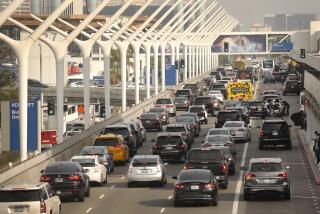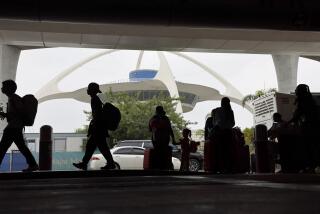‘Black Monday’ for Travel at Salt Lake International
- Share via
SALT LAKE CITY — There were no medals for the last event at the Winter Olympics--the marathon on Monday to leave Salt Lake City.
Tens of thousands of travelers trying to fly home endured huge lines stretching from the inside of terminals to curbside arrival areas at Salt Lake International Airport.
Waits of four hours just to reach ticket counters were common as luggage replaced luge.
“I have been here for 13 years and I have never seen crowds like this,” said Barbara Gann, public relations director for the city’s Department of Airports.
Gann said it was the busiest day in the airfield’s history.
Locally, the massive getaway was called “Black Monday” as the airport braced for as many as 74,000 passengers.
The crush was complicated by security problems.
The airport was shut Sunday night during the closing ceremony. Shortly after it reopened, one of the metal detectors used to screen travelers failed. Security officials ordered both of the airport’s terminals cleared so passengers could be screened again after the detector was fixed.
That resulted in delays and cancellations for some flights early Monday. Some planes departed empty Monday as pilots were forced to take off so they would not violate the maximum flying time under federal regulations.
Even Medalists Waited in Line With Everyone
As the lines grew longer, lightly dressed passengers headed for warmer climates stood shivering in the cold as Olympic volunteers and airport employees handed out water, hot chocolate and coffee.
“I almost wore shorts. We packed all our warm clothes,” said Greg Picinich, who was on his way to Hawaii.
The midsize airport was swamped as buses disgorged spectators, Olympic officials and athletes in colorful parkas. Even medalists waited in line with everyone else. Up and down the queue, passengers who missed connections called travel agents on cell phones seeking other flights. One enterprising Olympic volunteer trolled the line trying to sell his uniform for $500.
“I’ve never seen it like this,” said Susan Swenson, a gate agent for Delta Air Lines. “I really feel bad for the passengers.”
“I was here at 4 a.m., and it was just as bad then as it is now,” said Melissa Carling, a sales clerk at one of the airport’s souvenir shops. People jammed the store in a last-ditch effort to buy pins, T-shirts, flags, glass globes with artificial snowflakes and other memorabilia--mostly marked down.
“Crazy? It’s insane,” Carling said.
Alessandro Trovati, a photographer based in Milan for Associated Press, said he arrived at 5 a.m. for a 10 a.m. flight to New York. Because of the lines, he missed the plane and finally settled for a 5 p.m. flight to Philadelphia, connecting to Boston and finally to Milan.
“I have made many Olympics, but never seen anything like this,” he said. “In Nagano [Japan] there were no problems.”
“I’ve lost two days,” Trovati lamented.
Mixed in with the Olympic crowd were those who unknowingly chose the wrong day to travel.
Charles Bullen and his wife live in Logan, Utah, and said they avoided Salt Lake City during the Games because of the crowds. On Monday, en route to Palm Springs, the couple found themselves trapped at the airport on its busiest day.
“We couldn’t believe the lines would be this long,” Bullen said.
For a Few, Waiting Was Done With a Smile
Most people took the delays in stride.
“She’s having a ball. She’s getting out of school,” said Mary Humphrey, who returned to San Diego with her 10-year-old daughter and her husband, who was far less patient.
“My husband is so mad,” she added. “He said that nothing we saw at the Olympics was worth this.”
But two women from Nashville expressed a different opinion.
“We inadvertently were directed to the front of the line. Nobody even said anything,” said Terry Lucksinger, exhibiting a triumphant but somewhat sheepish smile. “It took only 10 minutes. We felt really bad. We hang our heads in shame.”
*
Times staff writer John J. Goldman in New York contributed to this report.
More to Read
Go beyond the scoreboard
Get the latest on L.A.'s teams in the daily Sports Report newsletter.
You may occasionally receive promotional content from the Los Angeles Times.








